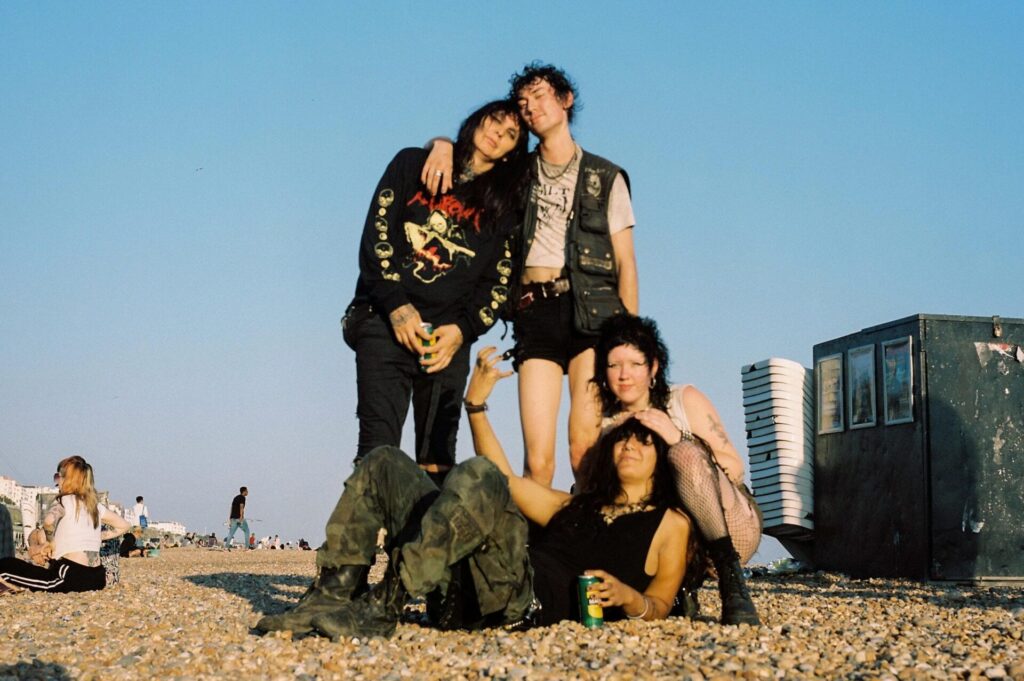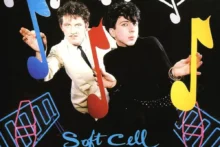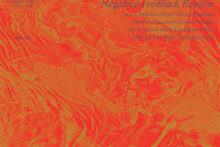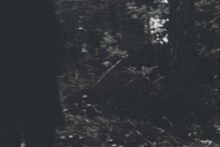The debut LP by devastating London hardcore group Traidora is titled Una Mujer Trans Sin País – ‘a trans woman without a country’ – and is the project’s second studio recording after 2023 demo Un Cuerpo Trans Lleno De Odio, or ‘a trans body full of hate’. Those are what you might call statement titles, and if they prepare you for something autobiographical, this is not wrong as such, but potentially misleading.
A four-piece on this release, Traidora was previously the one-woman band of Eva Leblanc, resident in the UK for a decade after time spent in Venezuela, Chile and mainland Europe. Her songs are informed by this, and by her existence as a trans woman. Una Mujer Trans Sin País’ closing song is called ‘Disgender’, a title I for one am pleased this specific group have used; it’s 17 seconds long and in something like an early grindcore style. In that respect, it’s an atypical example of this release, but the band are in certified speedfreak mode a sight more often than you might expect if you’ve heard Un Cuerpo or even caught a Traidora live show in recent months.
The recording, both bell-clear and oil-crude, is platonically ideal for the sound it’s preserving: drums boiling over with chaotic fills, bass runs that border on crossover at times, unrelenting guitar that sounds like it’s being played with a rusty blade instead of a pick… even when the band tease something like a flamenco sound on the intro of ‘Cenizas En El Rostro’. And of course there’s Eva, whose vocals are wholly in Spanish and delivered with extraordinary viciousness. Gonna conclude with a headsup: Una Mujer Trans Sin País is the first of two essential records to bear her name this autumn, the other being an imminent live album where her guitar playing accompanies the spoken words of Eve Libertine, ex of Crass.
Sex Dwarf are from Stockholm and their first album was titled Non-Stop Erotic Noise Cabaret, so you know they know what’s up. Soft Cell references notwithstanding, they have tended to play fastidiously committed-to-the-microgenre noisepunk with tinnitus feedback swirls and cymbals that loosen your fillings. That is mostly what they are doing on new LP Påhittad Värld, co-released by Armageddon and Children Of The Grave, and to beautifully draining effect.
But they begin with a title track on something of a psychedelic tip, with Butthole-beat tribalism and a Destruction Unit guitarchestra. It’s exactly 390 seconds of heat! And if any spikey jacket types make out like it’s a weakening of what Sex Dwarf normally do, they want to shut up. Still, the rest of Påhittad Värld is a more familiar iteration of this band, and not only do they tear it up nine more times, I’d make an earnest case for its psych credentials too. Check the solos on ‘War Peace’ and ‘Makt, Krig, Svält, Död’ – entering the fray with classic kängpunk indelicacy, sure, but embellished with layers of frazzledness that make Sex Dwarf guitarist Nicke Grängsjö sound like some peyote-pummelled proto-metal biker with no conception of turning down.
Since January, the Swedes of Brainbombs have been unusually active, relative to their informal policy of playing live exactly once per year and with their last album, Cold Case, released just before the first instance of global lockdown. Following some European and North American shows (with, next January, their first UK ones for several years), here are eight new songs in their oft-imitated dirge rocking style, titled Die and issued via Riot Season and Australia’s Fuzzed Atrocities.
With a Stanley knife forming the ‘i’ of the title on the cover, and the album bookended by songs called ‘Midnight Slaughter’ and ‘Kill Again’, Die promises much to established fans of Brainbombs’ grubby gruesomeness, where Peter Råberg most commonly assumes the character of a deranged murderer. To some extent, this is upheld – the median vibe here is satisfyingly clammy and scowling, with the band’s trademark tuneless trumpet showing up on ‘Cooking You’ and others – but the LP’s mix foregrounds riffs over vocals more than their older releases, meaning you don’t really catch most of Råberg’s lyrics.
All things considered, this might be a blessing, though there’s a sense that Brainbombs – or their lyricist, Peter’s brother Dan Råberg – have been backing away from the excesses of their aesthetic for four albums or so now. Compared to Cold Case or predecessor Inferno, this album is a straight-ahead rocker: Stooges-bootleg wah and blare, a rhythm section who use repetition like a submission hold and, on ‘Parents Bed’, movement at a tempo brisker than you thought these dodgy gastropods could muster.
On their debut album Window Painted Shut, Manchester/ Todmorden four-piece Personal Hell trade in mid-tempo hardcore which bears hints of a few things it doesn’t exactly sound like: sludge metal, garage punk, stadium crust. Released on the Natural Sciences label, which is better known for bundling up bizarre Soundcloud rap than stuff like this, it feels like it’s going to avoid being embraced by any one current DIY scene, which I mean in a good way.
Window Painted Shut’s production is bottom-ended and there’s a learned doomy flamboyance to Al Wilson’s guitar playing, so even when Personal Hell are cranking it there’s provision for a few things to get cycled through. When they get back to strolling pace, they still sound liable to leave indentations in the pavement, draining burl nudging closer to Cherubs or Couch Slut. Wilson features, or has, in other hefty northern English bands such as Holy Scum and Ghold; Personal Hell singer Phil, whose online presence seems to be surname-free, has done time in Denim & Leather and Iron Drugs, who I for one class as a great unsung British hardcore group. He may actually be fronting his first band here, though attacks the role like a heavily seasoned bawler.
See, you have stuff like this self-titled LP by Sneer that does sound, to me, like textbook 2025 hardcore. This means it sounds like a lot of the hardcore from between (approx) 2009-2011, so by extension lots of hardcore from (approx) 1982-1984, though not necessarily what was canonised at the time. It’s stompy, ugly and confrontational, with keenly-timed mosh parts, some anarchogoth reverb, a really sharp recording and a singer with an agreeably disagreeable estuary English tone. There are also two palate-cleaning minimal synth type instrumentals which have no bearing on the record’s eight thrashier turns but help to make Sneer stick out a bit more.
Something else I factor in with these things is that Sneer are from Plymouth, which has built up its current scene from basically fuck all (the Crew Cuts label, who are releasing this LP, have had plenty to do with that), and so on a regional level there’s a lot more reason to lionise them than if they were from, let’s say, Leeds or Pittsburgh. I promise this is not supposed to be damning with faint praise: it’s a really good hardcore record! You might get on better if you approach it as an exemplar of a thriving national scene, though, rather than its apotheosis.
Ameretat’s self-titled LP (La Vida Es Un Mus) is, like Sneer’s, their first recorded product to be shared with the world; unlike Sneer, it approaches hardcore punk from an angle I don’t think you’ll have heard before. They’re a duo united by Iranian parentage, and a consequent wish to make something loud and intense with the audible influence of that nation’s folk canon (the band cite the music of the Bhaktiari specifically). On Ameretat, they achieve this with a touch as delicate as the end results are heavy and bearish, and we are categorically not limiting that “audible influence” to a sample, or an intro with no resemblance to the rest of the song.
‘Ghazal-e-ātish / Posht-e-pardeh’, a boldly lengthy opening song, progresses from solo drum tattoo to insistent droning strings (possibly a tār?) with part-submerged spoken word before metal-edged punk guitar and belligerent crustcore vox enter the picture. It’s complex without being proggy, or ever forgetting to go for the throat, and the use of Middle Eastern tunings across the album renders Ameretat about as musically distinctive as a contemporary DIY punk band can be while still, you know, sounding like one. Both members have totted up various bands over the last decade or so, including ones in which their heritage is in play – Steve Lucas in Zanjeer, Kimia Haghighi in Khiis – but this one goes deeper, and feels like a remarkable achievement.
An abrasive neon-striplit voice-modulated synth-forward noiserock sass session can really clear the sinuses horseradish style, and that’s what Los Angeles’ Guck are doing to me. Three One G Records have delivered their debut album, Gucked Up; it may be that the group’s five members aren’t decrepit enough to remember the early-2000s scene which had this label at its epicentre, but I am, and it strikes me Guck would have fitted in like a Tetris block. That is, either very satisfyingly or very annoyingly depending on how you let things roll.
In the contemporary landscape, they’re perhaps at the midpoint between Fashion Tips and Guttersnipe – two northern English bands, indeed, though this is a musical style where the USA has generally dominated the convo. Vocalist April Gerloff, fed through a laundry list of effects, is needling and sardonic, while her bandmates (drummer Kyle Bray, guitarist Chappy Hull, bassist Andrew Morrill and synth player Sam Rogich) lay down thick digital-sludge grooves that occasionally threaten to be ‘danceable’ in the traditional sense but are more often closer to bad-attitude funsters like Arab On Radar and AIDS Wolf. Speaking of names people find objectionable, ‘Guck’ is very much one I’m forcing myself to look past, so congratulations or something.
When John Andrews crops up with something new, that’s normally a cue to clear a space in here! During Straight Hedge’s lifetime this has included Machiavellian Art, Half Brick and The Salopian, the latter of which was a home-recorded solo project in a sort of rural emo style and on the theme of Shropshire’s myths and legends. Andrews’ latest incarnation, Logger Head, is another solitary gambit whose name references Shrewsbury’s coat of arms.
So while this self-released four-song cassette seems to be a spiritual cousin of The Salopian, musically it’s quite different: somewhere between blackened punk and industrially-inclined noise rock, put across in a feral manner I’d be keen to call ‘goblin mode’ if that didn’t already mean something else. It sets out its stall early on, with the first of four untitled songs opening with blank/ blackout synth fuzz, ONE-two ONE-two hobnail boot beats and obscure riff chemistry clouded by gas leak feedback. The second number comes closest to hardcore, or at least someone corpsepaint-curious like Sexdrome, and the last adopts that skysplitting Big Black type guitar tone that makes everything feel epic despite it barely cracking two minutes.
When Kay Logan crops up with something new, that’s a cue to clear a space in here, unless it’s completely unsuited stylistically, which it often is. Here, then, are Glasgow’s The Gall, who are doing some wicked sick stick-thin machinified aquatic deathrock and have been deemed SUITED. Anxiety – one of this landmass’ greatest DIY hardcore groups of the last decade and counting, featuring Logan on bass – had their goth tendencies, and The Gall certainly do, yet a very different sound emerges on debut tape You’re Opening Doors You Don’t Understand.
A duo of Logan and her partner Sim Gray (the release also introduces a label they’re doing together, Shunning Ground, initially at least for their own music), this ten-minute demo conveys a certain, perhaps understandable insularity, and the sense there might be coded language unintelligible to outsiders. It features three ‘proper’ songs of the exact same length and three interludes of the exact same length, which could be meaningful, though I think I’d find it more satisfying if it wasn’t at all. A drum machine pistons along at hectic pace, guitars swirl and crunch in the same pocket of air and the vocals, sometimes digitally processed, appear more as obscure oaths than formed thoughts. Recommended to fans of the Cocteau Twins and Uniform… or anything in the large gap ‘twixt those groups.
Nottingham’s No Peeling cite their moment of conception as a “Jeff Goldblum gif” shared between the five members, which may hint at a lighthearted nature, and their self-titled debut 7-inch – released (on US label Feel It) about 12 months after that gif, and four months after their debut gig – backs up that hint. I don’t wish to suggest these are people who shrug at the modern age’s unfathomable atrocities, only that this hyperactive keyboarded-up post punk may serve as a type of self-preservation even as its songs lean hard into ‘life’s tiny yet recognisable moments’ subject matter.
No Peeling recorded this EP at their local DIY venue JT Soar, which was co-founded by the band’s guitarist Phil Booth. A previous group of his, Slumb Party, have certain commonalities with what happens in this eight-minute rickety tram ride, but No Peeling are faster and their songs are shorter, often under a minute. Two of them are also sung from the perspectives of a CPR training mannequin (‘Resuci Annie’) and urban scavenging animal (‘Street Feast’). Singer Sophie Diver is a recognised figure on the East Midlands poetry scene, and while her words here nevertheless stay cheerfully in the realm of ‘lyrics’, anyone who comes up with “If your girlfriend is resistant / I’m your limbless magician’s assistant” clearly isn’t partaking in their first rodeo.
Straight Hedge Mix October 2025
Traidora – Ella
Sex Dwarf – Påhittad Värld
Brainbombs – Cooking You
Personal Hell – Lips Around The Valley
Sneer – Fake
Ameretat – Koshtan-e Ye Sag-e-āb
Guck – Taz
Logger Head – III
The Gall – Man Of The House (Must Protect The Witnesses)
No Peeling – Resuci Annie





